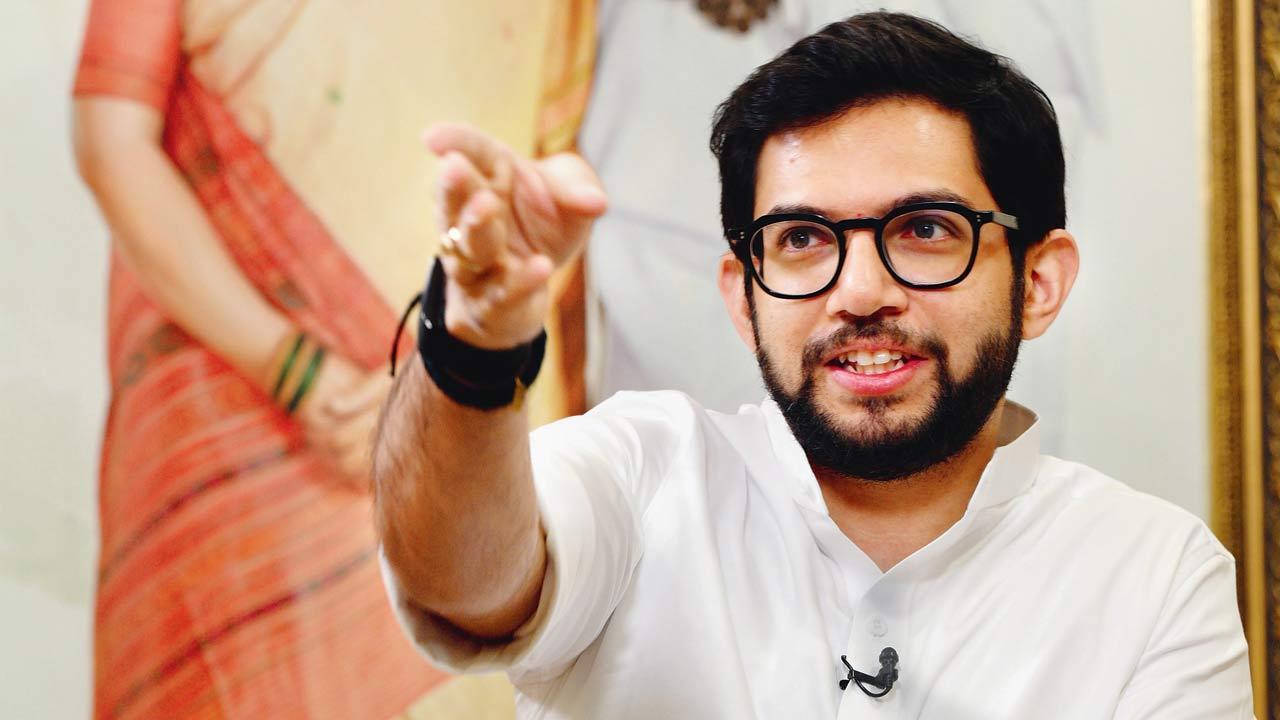Shiv Sena (UBT) leader says seawater plants can meet Mumbai’s growing needs as they are also cost-effective today; experts back him

Shiv Sena (UBT) MLA Aaditya Thackeray at his residence in Bandra. File pic/Rane Ashish
Desalination is no more expensive than dams, claims Aaditya Thackeray. GenNext Shiv Sena (UBT) leader Aaditya Thackeray has argued that Mumbai’s water requirements should rely on desalination projects instead of rain-dependent solutions like building more dams.
ADVERTISEMENT
In a candid conversation with mid-day, Thackeray emphasised that constructing new dams, which involves axing thousands of trees, is not the ideal approach. “Even if one constructs a dam, where would you get the water from if there is no rain? We need to shift from rain dependency to other sources to meet the city’s water requirement,” he said.
Currently, Mumbai requires 4,463 MLD of water, but only 3,950 MLD is supplied. The proposed Gargai dam, which is 80km to north of Mumbai, with a capacity of 440 MLD, is expected to help reduce this gap, according to the BMC.
When asked about the high costs associated with desalination, Thackeray pointed out that these expenses have dropped significantly over the past decade. “Ten years ago, producing one litre of water through desalination cost Rs 27. Today, it has come down to Rs 11.50. The cost of water supplied by dams is similar to that of desalination,” he explained.
Thackeray stated that the BMC spends Rs 11.50 to produce every 1,000 litres of water. However, thanks to subsidies, citizens pay just R6 per 1,000 litres for residential usage. “Water from desalination plants can also be supplied at the same subsidised cost,” he added.
He criticised dam construction for its high financial burden, lengthy timelines, and environmental cost. Referring to the ambitious Gargai dam project, Thackeray said, “Building such dams requires cutting and transplanting nearly 5 lakh trees, resulting in a significant loss of green cover. This isn’t an issue with desalination projects.”
To meet the city’s growing water demands, the BMC proposed the Gargai dam in Palghar district in 2015. Backed by then chief minister Devendra Fadnavis, the project has faced significant delays due to environmental concerns.
Experts say
Anand Pendharkar, CEO and ecologist at SPROUTS, stated that mega dams are an obsolete form of infrastructure that is being decommissioned globally. “They are a clear sign of non-inclusive and shortsighted development ideologies,” he said.
“Big dams are also environmental disasters that cause ecological losses, affecting ecosystems and biodiversity. They disrupt the social fabric by displacing tribals and poor farmers in submergence zones, pushing them into urban slums, and increasing incidences of suicides and migration. This benefits the builders and slum mafias, who exploit these situations for vote-bank politics.
These dams are often created to serve heavy industries, megacities, and resource-intensive agriculture—primarily benefiting the wealthy. This approach is unconstitutional as it denies the poor and marginalised equal rights to resources and dignified livelihoods, violating Article 21. Mega dams also impose long-term financial burdens, leading to debt and additional taxation on the public,” Pendharkar added.
He proposed alternatives to mega dams, including compulsory urban water harvesting in all buildings (old and new), rejuvenation of historical wells, ponds, lakes, rivers, and other traditional blue-green infrastructure. He emphasised the importance of improving water catchment areas, micro-watershed management (forests), and recycling and treating grey water for non-drinking needs such as flushing toilets, watering gardens, and washing vehicles.
“Changes like adjusting public area slopes, reducing concrete surfaces, actively removing it from footpaths, parking lots, and bus depots, installing fountains and cascades, and increasing green cover will enhance groundwater quality and quantity. Conducting water audits for rice, sugarcane, and other water-intensive crops, as well as industries, is urgently needed. Decentralising water needs and addressing transportation losses—equivalent to the capacity of a new dam—can bridge the deficit. Mega dams are outdated and, in today’s society, clearly, an election gimmick causing permanent socio-economic and ecological damage,” Pendharkar concluded.
Wildlife conservationist Kedar Bhide from the Corbett Foundation highlighted the ecological damage already inflicted on Mumbai’s hinterland to meet the city’s water needs. “Planning Mumbai’s future water needs requires caution. It’s essential to assess whether the water budget is based on actual drinking water needs or includes over-ambitious provisions for non-drinking purposes. Has the BMC addressed pilferage and theft from existing pipelines? Is Mumbai adequately harvesting rainwater? Why not make budgetary provisions to help housing colonies use and reuse rainwater?” asked Bhide. He added that building the Gargai Dam would lead to an ecological disaster.
“Desalinating seawater, though not entirely environment-friendly, is still a better option than submerging another forest ecosystem to support an ever-growing city with no clear action plan for mitigating climate change or managing floodwater drainage. Lastly, we must urgently evaluate the city’s carrying capacity based on the sustainable availability of natural resources,” Bhide concluded.
(With inputs from Prajakta Kasale)
 Subscribe today by clicking the link and stay updated with the latest news!" Click here!
Subscribe today by clicking the link and stay updated with the latest news!" Click here!







